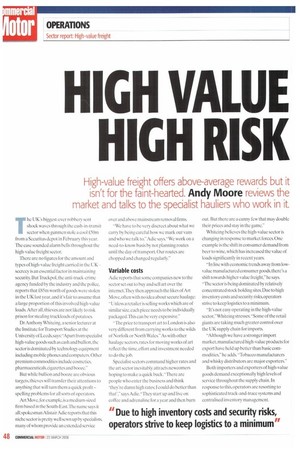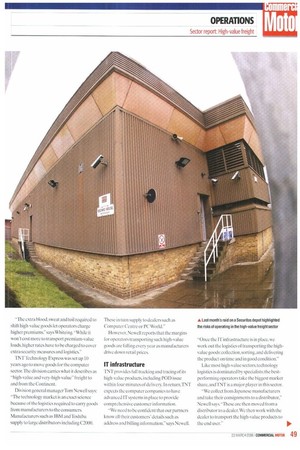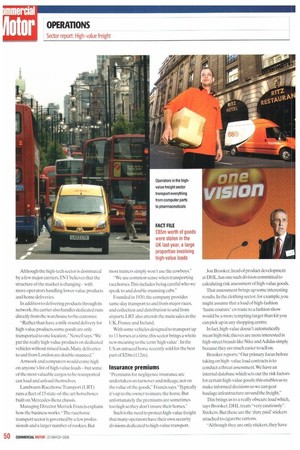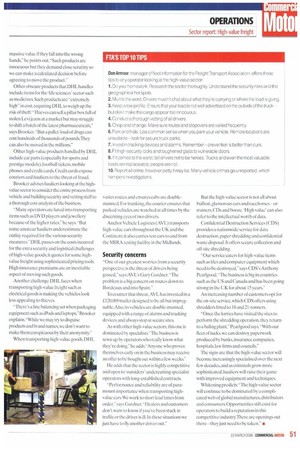Gil VALUE
Page 48

Page 49

Page 50

Page 51

If you've noticed an error in this article please click here to report it so we can fix it.
HIGH RISK
High-value freight offers above-average rewards but it isn't for the faint-hearted. Andy Moore reviews the market and talks to the specialist hauliers who work in it.
The UK's biggest-ever robbery sent shock waves through the cash-in-transit sector when gunmen stole a cool £50m from a Securitas depot in February this year. The case sounded alarm bells throughout the high-value freight sector.
There are no figures for the amount and types of high-value freight carried in the UKsecrecy is an essential factor in maintaining security. But Truckpol, the anti-truck-crime agency funded by the industry and the police, reports that £85m worth of goods were stolen in the UK last year. and it's fair to assume that a large proportion of this involved high-value loads. After all, thieves are not likely to risk prison for stealing truckloads of potatoes.
Dr Anthony Whiteing, a senior lecturer at the Institute for Transport Studies at the University of Leeds, says:"Apart from specialist high-value goods such as cash and bullion, the sector is dominated by technology equipment including mobile phones and computers. Other premium commodities include cosmetics. pharmaceuticals.cigarettes and booze."
But while bullion and booze are obvious targets, thieves will transfer their attentions to anything that will turn them a quick profit spelling problems for all sorts of operators.
Art Move, for example, is a medium-sized firm based in the South-East.The name says it all;spokesman Alistair Adie reports that this niche sector is pretty well sewn up by specialists, many of whom provide an extended service over and above mainstream removal firms.
"We have lobe very discreet about what we carry by being careful how we mark our vans and who we talk to," Adie says. "We work on a need-to-know basis by not planning routes until the day of transport. Our routes are chopped and changed regularly."
Variable costs
Adie reports that some companies new to the sector set out to buy and sell art over the internet.They then approach the likes of Art Move, often with no idea about secure haulage: "Unless a retailer is selling works which are of similar size, each piece needs to be individually packaged.This can be very expensive."
"The price to transport art to London is also very different from carrying works to the wilds of Norfolk or North Wales."As with other haulage sectors, rates for moving works of art reflect the time, effort and investment needed to do the job.
Specialist sectors command higher rates and the art sector inevitably attracts newcomers hoping to make a quick buck. "There are people who enter the business and think 'they're damn high rates; I could do better than that"." says Adie. "They start up and live on coffee and adrenaline for a year and then burn out. But there are a canny few that may double their prices and stay in the game."
Whiteing believes the high-value sector is changing in response to market forces. One example is the shift in consumer demand from beer to wine, which has increased the value of loads significantly in recent years.
-In line with economic trends away from lowvalue manufactured consumer goods. there's a shift towards higher-value freight," he says. -The sector is being dominated by relatively concentrated stock holding sites. Due to high inventory costs and security risks, operators strive to keep logistics to a minimum.
"It's not easy operating in the high-value sector." Whiteing stresses. "Some of the retail giants are taking much greater control over the UK supply chain for imports.
"Although we have a stronger import m arket, manufactured high-value products for export have held up better than basic commodities:he adds. "Tobacco manufacturers and whisky distributors are major exporters."
Both importers and exporters of high-value goods demand exceptionally high levels of service throughout the supply chain. In response to this, operators are resorting to sophisticated track-and-trace systems and centralised inventory management. "The extra blood, sweat and toil required to shift high-value goods let operators charge higher premi urns," says Whiteing. "While it won't cost more to transport premium-value loads, higher rates have to be charged to cover extra security measures and logistics."
TNT Technology Express was set up 10 years ago to move goods for the computer sector.The division carries what it describes as "high-value and very-high-value" freight to and from the Continent.
Division general manager Tom Newell says: "The technology market is an exact science because of the logistics required to carry goods from manufacturers to the consumers. Manufacturers such as IBM and Toshiba supply to large distributors including C2000. These in turn supply to dealers such as Computer Centre or PC World."
However, Newell reports that the margins for operators transporting such high-value goods are falling every year as manufacturers drive down retail prices.
IT infrastructure TNT provides full tracking and tracing of its high-value products.including POD issue within four minutes of delivery. in return,TNT expects the computer companies to have advanced IT systems in place to provide comprehensive customer information.
"We need to be confident that our partners know all their customers' details such as address and billing information," says Newell. "Once the IT infrastructure is in place, we work out the logistics of transporting the highvaluegoods:collection,sorting, and delivering the product on time and in good condition."
Like most high-value sectors, technology logistics is dominated by specialists: the bestperforming operators take the biggest market share, andTNT is a major player in this sector.
"We collect from Japanese manufacturers and take their consignments to a distributor," Newell says. "These are then moved from a distributor to a dealer. We then work with the dealer to transport the high-value products to the end user." Although the high-tech sector is dominated by a few major carriers,TNT believes that the structure of the market is changing— with more operators handling lower-value products and home deliveries.
In addition to delivering products through its network, the carrier also handles dedicated runs directly from the warehouse to the customer.
"Rather than have a milk-round delivery for high-value products, some goods are only transported to one location,Newell says."We put the really high-value products on dedicated vehicles without mixed loads. Many deliveries to and from I .onclon are double-manned.
Artwork and computers would come high on anyone's list of high-value loads — but some of the most valuable cargos to be transported can load and unload themselves.
Lamboum Racehorse Transport (LRT) runs a fleet of 15 state-of-the-art horseboxes built on Mercedes-Benz chassis.
Managing Director Merrick Francis explains how the business works: "The racehorse transport sector is governed by a few professionals and a larger number of rookies. But most trainers simply won't use the cowboys."
"We use common sense when transporting racehorses.This includes being careful who we speak to and double-manning cabs."
Founded in 1930, the company provides same-day transport to and from major races, and collection and distribution to and from airports. LRT also attends the main sales in the UK, France and Ireland.
With some vehicles designed to transport up to 11 horses at a time, this sector brings a whole new meaning to the term 'high value'. In the US an unraced horse recently sold for the hest part of $20m (112m).
Insurance premiums
"Premiums for negligence insurance are undertaken on turnover and mileage, not on the value of the goods," Francis says. -Typically it's up to the owner to insure the horse. But unfortunately the premiums are sometimes too high so they don't insure their horses."
Such is the need to protect high-value freight that many operators have their own security divisions dedicated to high-value transport. Jon Brooker, head of product development at DHL, has one such division committed to calculating risk assessment of high-value goods.
That assessment brings up some interesting results. In the clothing sector, for example, you might assume that a load of high-fashion 'haute couture' en route to a fashion show would be a more tempting target than kit you can pick up in any shopping centre.
In fact, high-value doesn't automatically mean high risk; thieves are more interested in high-street brands like Nike and Adidas simply because they are much easier to sell on.
Brooker reports: Our primary focus before taking on high-value load contracts is to conduct a threat assessment.We have an internal database which sets out the risk factors for certain high-value goods; this enables us to make informed decisions so we can gear haulage infrastructure around the freight."
This brings us to a really obscure load which, says Brooker, DHL treats "very cautiously-. Stickers. But these are the 'duty paid' stickers attached to cigarette cartons.
"Although they are only stickers, they have massive value if they fall into the wrong hands," he points out. "Such products are innocuous but they demand close scrutiny so we can make a calculated decision before agreeing to move the product."
Other obscure products that DHL handles include items for the 'life sciences sector such as medicines, Such products are "extremely high" in cost, requiring DHL to weigh up the risk of theft:"Thieves can sell a pillar box full of stolen Levi jeans at a market but may struggle to shift a batch of the latest pharmaceuticals," says Brooker, 'But a pallet-load of drugs can cost hundreds of thousands of pounds.They can also be moved in the millions."
Other high-value products handled byDHL include car parts (especially for sports and prestige models), football tickets, mobile phones and credit cards. Credit cards expose couriers and hauliers to the threat of fraud.
Brooker advises hauliers looking at the highvalue sector to consider the entire process from vehicle and building security and vetting staff to a thorough cost analysis of the business.
"Many operators are lured into transporting items such as DVD players and jewellery because of the higher rates," he says."But some amateur hauliers underestimate the outlay required for the various security measures.DHL passes on the costs incurred for the extra security and logistical challenges of high-value goods; it quotes for some highvalue freight using sophisticated pricing tools. High insurance premiums are an inevitable aspect of moving such goods.
Another challenge DHL faces when transporting high-value freight such as electrical goods is making the vehicles look less appealing to thieves.
"There's a fine balancing act when packaging equipment such as iPods and laptops," Brooker explains. 'While we may try to disguise products and brand names, we don't want to make them conspicuous by their anonymity."
When transporting high-value goods, DM., varies routes and ensures cabs are doublemanned. For trunking, the courier ensures that parked vehicles are watched at all times by the discerning eyes of two drivers.
Anchor Vehicle Logistics (AVL) transports high-value cars throughout the UK and the Continent; it also carries test cars to and from the NI IRA testing facility in the Midlands.
Security concerns
"One ()lour greatest worries from a security perspective is the threat of drivers being gassed," says AVUs Gary Gardner. "The problem is a big concern on routes down to Bordeaux and into Spain."
To counter that threat, AVL has invested in a 1120,000 trailer designed to be all but impregnable.Also. its vehicles are double-manned, equipped with a range of alarms and tracking devices, and always stop at secure sites.
As with other high-value sectors, this one is dominated by specialists."The business is sewn up by operators who really know what they're doing," he adds. "Anyone who proves themselves early on in the business may receive an offer to be bought out within a few weeks."
Ile adds that the sector is highly competitive and open to 'outsiders' undercutting specialist operators with long-established contracts.
"Performance and reliability are of paramount importance when transporting highvalue cars.We work to short lead times from order," says Gardner. "Dealers and customers don't want to know if you've been stuck in traffic or the driver is ill. In these situations we just have to fly another driver out." But the high-value sector is not all about bullion, glamorous cars and racehorses or trainers. CDs and booze. 'High value' can also refer to the intellectual worth of data.
Confidential Destruction Services (CDS) provides a nationwide service for data destruction, paper shredding and confidential waste disposal. It offers secure collection and off-site shredding.
"Our service caters for high-value items such as tiles and computer equipment which need to be destroyed," says CDS's Anthony Pearlgood."The business is big in countries such as the US and Canada and has been going strong in the UK for about 15 years" An increasing number of customers opt for the on-site service, which CDS offers using shredders fitted to 18 and 21-tonners.
"Once the lorries have visited the sites to perform the shredding operation, they return to a baling plant," Pearlgood says. "With our fleet of tucks, we can destroy paperwork produced by banks, insurance companies, hospitals, law firms and councils" The signs are that the high-value sector will become increasingly specialised over the next few decades, and as criminals grow more sophisticated, hauliers will raise their game with unproved equipment and techniques.
Whitening predicts:"The high-value sector will continue to be dominated by a complicated web of global man ufactures, distributors and consumers. Opportunities still exist for operators to build a reputation in this competitive industryThere are openings out there -they just need to be taken."•




































































































































































































